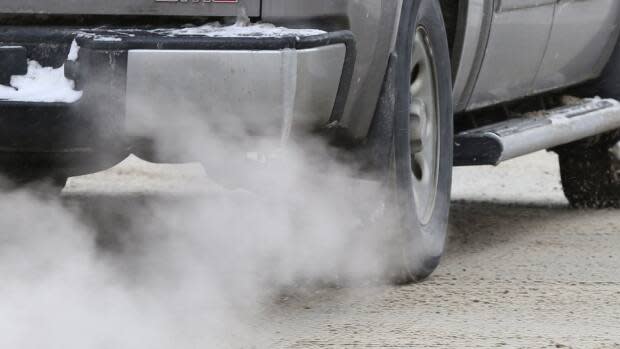Kitchener unlikely to ticket many idling drivers — but that's OK, clean air advocate says

If bylaw enforcement follows the trend of other municipalities that have passed anti-idling bylaws, Kitchener likely won't hand out many $75 tickets to drivers for idling their vehicles for more than three minutes.
But Gabriella Kalapos, executive director of Clean Air Partnership, says the new bylaw passed by city council on Monday can still be an effective tool to get people to turn off their engines while they sit and wait.
"It provides that verification that this is something that is not something to be … encouraged," she said. "Really, one of the key things we found with all of the work that we've done with the municipalities is education is one thing, bylaw is another thing. And education and the bylaw [together], that's the better option."
The Toronto-based Clean Air Partnership works with municipalities on improving air quality and climate action projects.
Kalapos says in the research the group has done, it found most municipalities do not actively enforce their anti-idling bylaws. Instead, it's largely complaint-based investigations. Because of that, not many people are fined because either the bylaw officer arrives too late or the person drives away before they're found to be contravening the bylaw.
Instead, she says it's important for municipalities to educate drivers and focus on the right people. That could mean putting up signs near daycares and schools, near COVID-19 testing sites or grocery stores and talking to drivers who might be sitting and waiting.
"A lot of people end up idling, not because they really want to put more up in the air, but they just don't think about it," she said.
"We've got a lot on our plate. We've got many other things to consider. Are we just sitting there waiting? We want to listen to the radio. We keep the engine running. We just don't even think about it."
Education 'the best tool'
Shayne Turner, director of municipal enforcement services for the City of Waterloo, acknowledged the city's bylaw officers hand out about five tickets a year under the bylaw. It's because a bylaw officer has to stand and watch a vehicle idle for three minutes before handing out a ticket.
Cambridge communications staff said in the past two years, no tickets have been issued under their anti-idling bylaw, which allows vehicles to idle for just one minute.
"Education is likely the best tool to encourage reduced idling," Turner said in an email. "We will be looking at a refreshed education program this spring."
Kitchener Coun. Margaret Johnston brought the idling issue to council after she was approached by a resident who was upset about trucks idling near her home and she realized the city didn't have a bylaw.
She says for her, the education component of the bylaw is the most important part.
"If we can make people think about how their actions are contributing to climate change, that, to me, is the most important piece and to have them think about what those actions mean and change those," she said.
Other positive initiatives
The new bylaw is also part of Kitchener's community climate action plan. Kalapos says in recent years, her group has seen more municipalities focusing on what they can do to make a difference for climate change, and that's encouraging.
She says many municipalities are creating corporate energy plans, which includes determining how to reduce greenhouse gas emissions locally, how to use waste to create energy and how to create net-zero emission plans. Municipalities are also looking at how to reduce emissions with their fleet, be it transit or staff vehicles.
"Another area where I'd say municipalities are also improving upon is in green development standards. So improving the sustainability either how much precipitation is dealt with on site or the energy performance of the buildings," she said.
"The other one that I find super exciting is we are finally … building up support for building energy retrofits within existing buildings," she added.
She noted every municipality has a plan to put a home energy efficiency retrofit financing program in place.
"But we haven't been able to make a lot of progress. These programs are quite expensive and they're challenging to deliver," she noted, but added recent funding from the federal government means it may be easier for that kind of program become a reality.
"Right now, it's only Toronto that has it in place, but there's going to be more municipalities in the coming years, which is super exciting."
Focus remains on climate despite COVID
Despite the pandemic taking people's attention away from other matters, including the environment, Kalapos says she's encouraged to see many municipalities haven't completely lost focus on the issue.
"I was really worried when COVID hit because I was though, oh, here we go again," she said.
Just before the 2008 financial crisis, she noted Al Gore had just come out with his movie, Inconvenient Truth and there was a "really good critical mass of people paying attention to climate."
When the financial crisis hit, people were distracted and environmental issues were pushed to the back burner. But this time, she says young people in particular deserve a lot of the credit for driving action on climate change and ensuring it's not forgotten.
"I can't say enough about that and that we're seeing some great momentum taking place," she said.
"But I think one of the things that happened that COVID made us realize as a humanity, which the financial crisis didn't seem to do to us, was the vulnerability of humanity to nature," Kalapos said.
"I think we've kind of gotten a little bit humbled and I think that's helped people realize the implications of what climate impact could mean for society as a whole and that we can and must do better."

